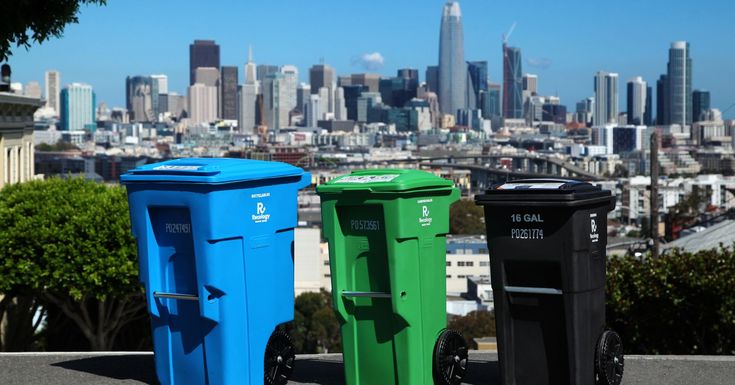- Admin
- Apr 05, 2025
- Energy & Environment
Top Waste Management Companies in San Francisco
Reliable Waste Management Services in San Francisco
San Francisco has long been a pioneer in sustainability and environmental conservation. Its robust Waste Management Services San Francisco network has become a national model for handling municipal solid waste, integrating cutting-edge recycling, composting, and waste-to-energy solutions. These services support the city's broader environmental objectives, which are interwoven with sectors such as Renewable Energy Services San Francisco, Solar Energy Solutions San Francisco, and Wind Energy Companies San Francisco. By connecting waste management with renewable energy and sustainability innovations, San Francisco addresses environmental challenges with a comprehensive, data-driven approach. From Hydroelectric Power Plants San Francisco to Geothermal Energy Providers San Francisco, the city fosters a cohesive system that lowers emissions, supports circular economies, and enhances community health.
Advancing Waste Management Through Renewable Energy Integration
One of the cornerstones of effective waste management in San Francisco is its integration with Sustainable Energy Solutions San Francisco. Organic waste, for example, is processed into biogas that powers local facilities. This bioenergy helps fuel Hydroelectric Power Plants San Francisco and complements output from Geothermal Energy Providers San Francisco, creating a reliable and clean energy matrix. Further, Solar Panel Installation Services San Francisco contribute to powering waste processing facilities with solar energy, while Wind Turbine Maintenance Providers San Francisco ensure optimal performance of renewable infrastructure supporting waste-to-energy conversions. These dynamic integrations reduce greenhouse gas emissions, enhance local energy independence, and create jobs in green technology sectors.
Consulting for Efficiency and Environmental Impact
The partnership between Environmental Consulting Firms San Francisco and Energy Efficiency Consultants San Francisco ensures continuous improvement of waste management systems. These professionals conduct audits, develop strategies, and design custom implementation plans that optimize energy use and waste handling procedures. Such audits, often done by Energy Auditing Firms San Francisco, assess energy flows and equipment performance, identifying gaps in efficiency. These findings support changes that increase recovery rates from materials processed at Recycling Facilities San Francisco, while decreasing operational costs and environmental impact.
Community Engagement, Recycling Innovation, and Smart Technologies
At the heart of San Francisco's waste strategy is its emphasis on recycling and composting. The city’s Recycling Facilities San Francisco process an array of materials, from plastics to electronics, using advanced automated sorting technology. This is crucial for achieving zero-waste goals and maintaining compliance with state regulations. Equally important is Composting and Organic Waste Recycling San Francisco, which transforms food scraps and yard trimmings into nutrient-rich compost. This effort not only diverts organic material from landfills but also supports local agriculture and landscaping. Eco Friendly Landscaping Companies San Francisco often utilize this compost to create sustainable green spaces, completing a beneficial environmental loop.
Tech-Powered Efficiency and Infrastructure Development
With the rise of Smart Grid Technology Providers San Francisco, the waste management industry benefits from predictive analytics and real-time monitoring. These systems allow for more precise collection routes, fuel use optimization, and better service responsiveness. Facilities also increasingly rely on Battery Storage Solutions San Francisco to store excess energy generated from biofuel and solar inputs. These battery systems support uninterrupted operations, even during grid outages or peak demand periods. This synergy between waste management and energy storage is helping shape a resilient and adaptive infrastructure.
Air, Water, and Climate Impact Mitigation
In tandem with physical waste management, the city’s environmental focus extends to air and water quality. Air Quality Monitoring Services San Francisco monitor emissions from waste processing centers, ensuring compliance with public health standards. Simultaneously, Water Purification Companies San Francisco contribute by treating runoff and leachate generated during waste decomposition, protecting nearby waterways.
Climate strategies, led by Climate Change Adaptation Services San Francisco and Reforestation and Afforestation Services San Francisco, complement waste reduction efforts. These services enhance biodiversity, reduce urban heat islands, and support carbon sequestration. Alongside Carbon Footprint Reduction Services San Francisco, these measures position the city as a leader in holistic environmental management.
FAQs on Reliable Waste Management Services in San Francisco
1. What services do Waste Management Services San Francisco offer?
They offer comprehensive solid waste collection, recycling, composting, and waste-to-energy services. These programs also collaborate with Renewable Energy Services San Francisco to ensure sustainable disposal methods.
2. How do Recycling Facilities San Francisco function?
They use modern sorting equipment to separate and process recyclables, contributing significantly to landfill diversion and resource recovery.
3. Who are the major Environmental Consulting Firms San Francisco involved?
Notable firms include Ramboll, AECOM, and ERM, which guide policy compliance, waste audits, and eco-efficiency solutions for public and private clients.
4. How is solar energy used in waste management?
Solar Panel Installation Services San Francisco help power processing centers, reducing dependence on non-renewable sources.
5. What role do Geothermal Energy Providers San Francisco play?
They contribute supplemental energy during colder months or low solar/wind production periods, ensuring continuous energy support for waste facilities.
6. How is community education handled?
Programs, often run by Environmental Impact Assessment Firms San Francisco, educate residents on recycling, composting, and sustainability practices.
7. Are hazardous materials also managed?
Yes, Hazardous Waste Disposal Companies San Francisco specialize in the safe transport and neutralization of medical, industrial, and chemical waste.
8. How many people are employed in the sector?
The industry employs approximately ten thousand individuals in the San Francisco area, including roles in transportation, recycling, auditing, and consulting.
9. What’s the average salary in this industry?
Waste management professionals earn an average of $65,000 annually, with higher salaries in technical and managerial positions within energy and environmental firms.
10. Where is the headquarters for the main service provider?
Recology, one of the leading waste services companies, is headquartered in San Francisco and oversees multiple operations citywide.
11. What technologies are used for tracking waste?
Smart Grid Technology Providers San Francisco integrate GPS, RFID, and AI algorithms to optimize waste collection and recycling logistics.
12. Are there green building tie-ins?
Yes, Green Building Solutions San Francisco work closely with waste services to use recycled materials and implement construction waste recycling programs.
13. Is there a connection with electric vehicles?
Yes, many collection fleets are powered by EVs, supported by Electric Vehicle Charging Stations San Francisco for daily operations.
14. How does battery storage benefit operations?
Battery Storage Solutions San Francisco store energy generated on-site for emergency power and off-grid functioning of waste processing facilities.
15. Are eco-friendly products being created from recycled waste?
Absolutely. Eco Friendly Product Manufacturers San Francisco turn recycled plastics and metals into consumer goods and building materials.
16. How do water conservation services intersect with waste management?
Water Conservation Services San Francisco design systems that minimize water use in waste processing and maximize reuse through greywater recovery.
17. What does the city do about food waste?
Food waste is redirected to Composting and Organic Waste Recycling San Francisco, processed into compost for gardens, parks, and farms.
18. Is there a link between wind energy and waste systems?
Yes, waste services use power from Wind Energy Companies San Francisco, while maintaining their turbines through Wind Turbine Maintenance Providers San Francisco.
19. How is carbon impact minimized?
Through collaboration with Carbon Footprint Reduction Services San Francisco, facilities calculate and reduce emissions through energy-efficient upgrades and offsets.
20. Are there any initiatives in place for climate resilience?
Yes, Climate Change Adaptation Services San Francisco develop resilience plans that integrate waste management into broader environmental strategies, safeguarding against climate threats.




Share on